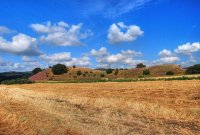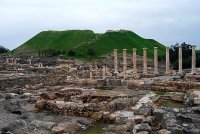seekeroftruth
Well-Known Member
Deuteronomy 13:12 If you hear it said about one of the towns the Lord your God is giving you to live in 13 that troublemakers have arisen among you and have led the people of their town astray, saying, “Let us go and worship other gods” (gods you have not known), 14 then you must inquire, probe and investigate it thoroughly. And if it is true and it has been proved that this detestable thing has been done among you, 15 you must certainly put to the sword all who live in that town. You must destroy it completely, both its people and its livestock. 16 You are to gather all the plunder of the town into the middle of the public square and completely burn the town and all its plunder as a whole burnt offering to the Lord your God. That town is to remain a ruin forever, never to be rebuilt, 17 and none of the condemned things[c] are to be found in your hands. Then the Lord will turn from his fierce anger, will show you mercy, and will have compassion on you. He will increase your numbers, as he promised on oath to your ancestors— 18 because you obey the Lord your God by keeping all his commands that I am giving you today and doing what is right in his eyes.
b. Deuteronomy 13:15 The Hebrew term refers to the irrevocable giving over of things or persons to the Lord, often by totally destroying them.
c. Deuteronomy 13:17 The Hebrew term refers to the irrevocable giving over of things or persons to the Lord, often by totally destroying them.
This is from the easy English site.
Sometimes, people who gave honour to idols would affect whole towns. If a town allowed that to happen, the Israelites must destroy it. In those days, unity in a town or in a group of people was very strong. So they all were guilty. But the Israelites had to be certain that the town was guilty.
God did not allow them to keep anything from the town for themselves. That meant that people would not destroy a town for their own advantage.
The Israelites destroyed towns like Jericho (Joshua 6:17-21) and Gibeah (Judges 20:42-48). If all the people involved themselves in that very wicked behaviour, they all suffered the punishment. If there were good people in the town, they should have left. They should not remain where people worship false gods.
A man called Achan took goods from one of those towns. In Joshua 7, you can read what happened as a result of his act. (But note this. Joshua 6:23 says that Rahab escaped from Jericho because of her faith.) The Israelites should not live with people who did not believe God. If they did, the Israelites would not continue their beliefs.
God did not allow them to keep anything from the town for themselves. That meant that people would not destroy a town for their own advantage.
The Israelites destroyed towns like Jericho (Joshua 6:17-21) and Gibeah (Judges 20:42-48). If all the people involved themselves in that very wicked behaviour, they all suffered the punishment. If there were good people in the town, they should have left. They should not remain where people worship false gods.
A man called Achan took goods from one of those towns. In Joshua 7, you can read what happened as a result of his act. (But note this. Joshua 6:23 says that Rahab escaped from Jericho because of her faith.) The Israelites should not live with people who did not believe God. If they did, the Israelites would not continue their beliefs.
I found this description at studylight.org.
The destroyed town was to be left as a heap forever. The word heap is literally tell, and the word tell is used in Arabic for any ruined sight. Throughout Israel today, one will see curious mounds rising from a plain. These tells are the heaped up remains of ancient destroyed cities, covered over with centuries of dust and accumulated dirt.
These are pictures of tels in Israel.




